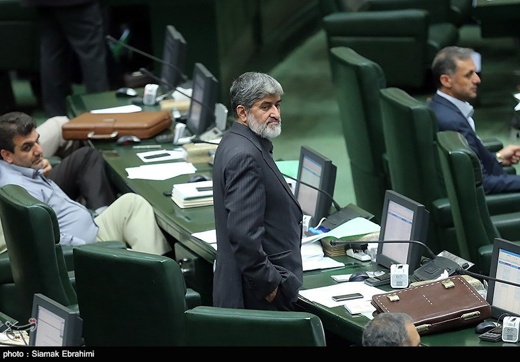Ali Motahari, the son of Martyr Morteza Motahari, a close associate of Imam Khomeini and a member of the Revolution Council who was assassinated in the early months of the Islamic revolution, is an outspoken principlist member of the Islamic Consultative Assembly.
In an interview with reformist daily Mardom-e Emrooz on December 30, the 58-year-old deputy answered a variety of questions including the house arrest of candidates who disputed the results of the 2009 presidential elections and caused widespread unrest, to upcoming elections and the problems of his fellow principlists. IFP has decided to translate his answer to the question the daily’s Farshad Azami posed about unity among principlists for upcoming parliamentary elections.
Q. Some principlists believe the key to success is disavowal of factions close to Ahmadinejad and the [Islamic Revolution] Stability Front. On the other hand, some believe in all-out consensus of all principlists. Such a difference of opinion could bode ill for principlists hoping to form a coalition in upcoming legislative elections. In the absence of Mahdavi Kani and Asgarouladi [who have both passed away] who do you think should lead the principlist camp?
A. Since principlists are facing serious competition today, they don’t have any choice but unite. The important question here is their interpretation of the principle of the rule of the jurisprudent. Some believe that before doing anything they need to learn about the viewpoint of the jurisprudent [Supreme Leader]. That has stripped them of the power of innovation. Some others believe they should do whatever they deem is correct, and if the leader issued an order, they would take account of it.
The first group has dealt a serious blow to principlism already. Their mindset has taken innovation away from them. For instance, in 2009 an overwhelming majority of principlists accepted that the management of Ahmadinejad did not serve the country’s interests and that they needed to agree on another candidate. When I put forth the idea of Mr. [Ali Akbar] Velayati, they all agreed to my proposal, but said they had to know what the leader thought of that choice.
Later they said they felt that the leader had a more favorable opinion of Ahmadinejad. That was how my proposal fell apart. Later some even said anyone who talked about another candidate was against the leader. And eventually they said they voted for Ahmadinejad with tears in their eyes.
That is the problem tying the hands of the principlists. It comes despite the fact that the leader does not approve of such an approach. To secure unity principlists need to solve this problem first. In other words, they need to ensure unity in their principles before practical unity manifests itself. They all talk about the rule of jurisprudent, freedom, justice and independence. But each one follows his/her own agenda. In other words, their unity is more rhetorical than practical.
As for individuals to lead the principlist camp in its bid to secure unity, I should say I believe individuals should not be at the center of unity. Rather, principles and thoughts should take center stage. Messrs Mahdavi Kani and Asgarouladi did not hold much sway. But if an arbiter is needed, I believe, Nategh Nouri and Ali Larijani who represent the moderate camp of principlists, Hosseinian and Haddad Adel, who are hardliners, and Mr. Badamchian, who represents the Islamic Coalition, could form a council.
I don’t think it is the right thing for the [Combatant] Clergy Association and the Society of Seminary Teachers to get involved in this, because such activities would hurt their status. They need to maintain their paternal status and not support any one group. Instead, they should serve as an umbrella under which both principlists and reformists can operate. These two groups should follow the lead of their founder, Martyr Motahari, in staying above partisan prejudice.
